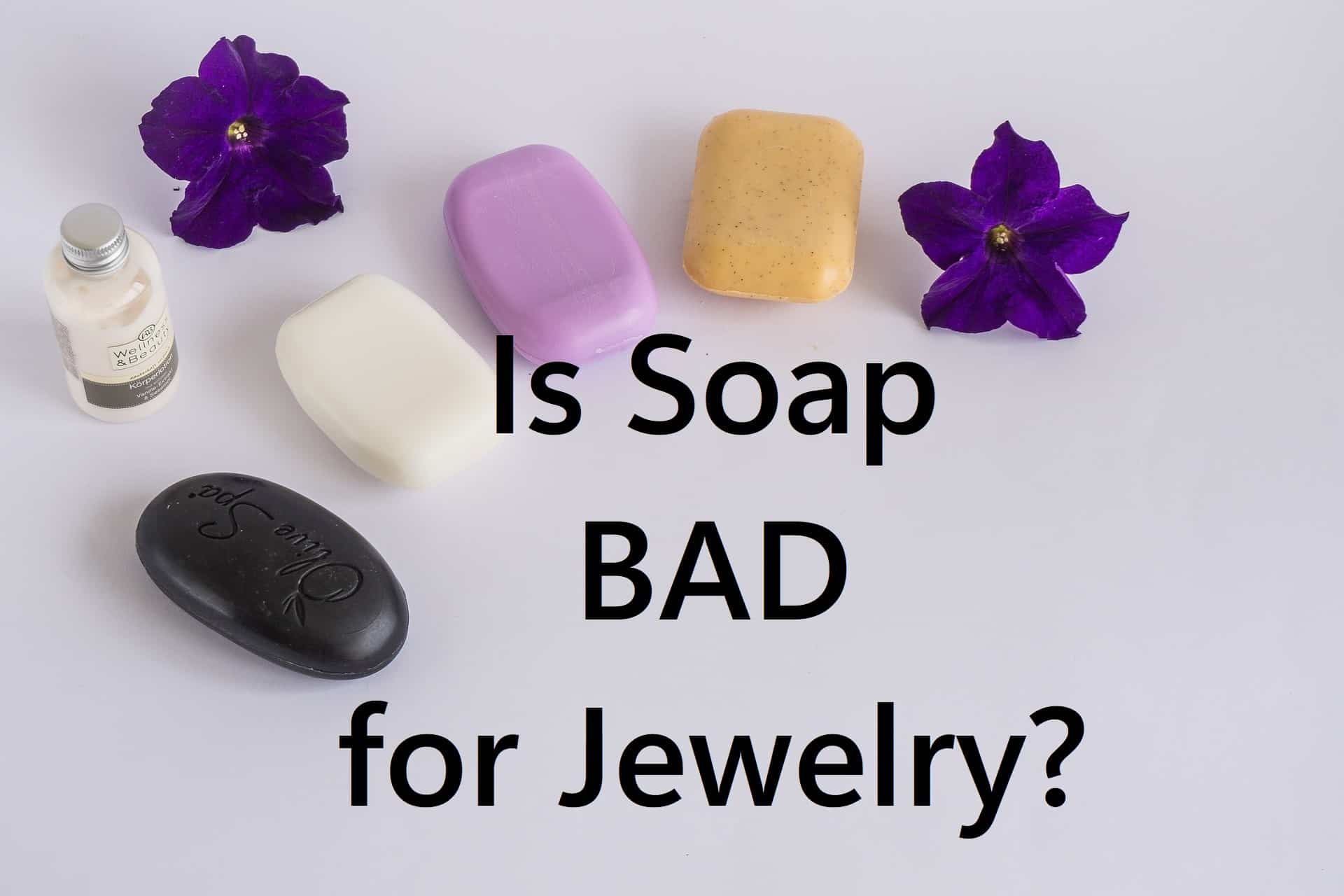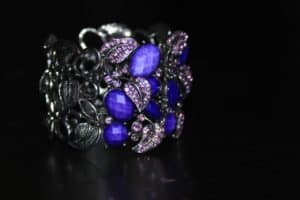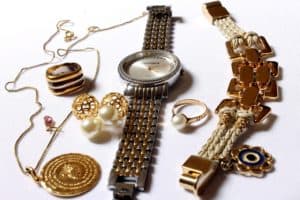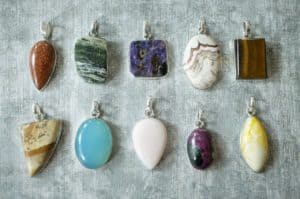Jewelry symbolizes extravagance and luxury and is a token of love and care. So, these things require your undivided attention. Maintaining each and every item in your jewelry collection can be quite a task, but it is a necessity. There are truly tons of stuff like industrial solutions, DIY solutions, ultrasonic machines, etc., that you can use to ensure the longevity of your shiny pieces. Undeniably, however, soap plays a prominent part in the cleansing process.
A simple solution of a little soap in lukewarm water can do wonders to your jewelry. A lot of times, gold and silver pieces look so clean after a quick cleanup using this solution and a very soft brush. However, all soaps are not okay to be used with jewelry. You need to stay away from soaps that have exfoliating agents and harsh drying chemicals like parabens and sulfates. Additionally, regular, fragrance free, mild soap, in pea sized quantities are safe. You must avoid harsh cleaning or dish washing soaps. Getting your jewelry professionally cleaned up once a year or in 18 months is always a good idea.
In this article, we will look at how safe it is to use soaps for different kinds of jewelry. Also, what kind of soaps work well and which ones should be avoided.
Can soap clean jewelry?
Yes, majority of soaps work well to remove the dirt from jewelry. Some soaps are also effective in removing oil build up and grime from it. Soap and water constitute the most suitable cleansing combination for your jewelry. You can use a mild solution of soap in water. But if you want to clean your gemstone jewelry, you need to be cautious as some gemstones may not work well with soap.
- The following points illustrate the easiest way to clean out your jewelry.
- To clean, first make a dilute soap solution, containing warm water and liquid soap. Mix it well. Let it rest.
- After a few minutes, gently place your jewelry into the mixture (avoid soaking if your jewelry has gemstones).
- Give it about 5-10 mins. This helps the soap absorb the maximum amount of dirt through the formation of micelles.
- Now, extract the pieces one by one. Clean them gently, using a soft-bristled brush to claw through the remaining grime. Be careful not to over-brush, as it can adversely lead the jewelry to lose its shine. It may also cause loss of metal over time.
- Lightly dry the pieces using a lint-free cloth/towel.

Does soap ruin jewelry and is bad for it?
Soap is not bad, but some kinds of soaps may be harmful. The right type of soaps for jewelry cleaning are liquid soap cleaners. Mild soaps are the best ones in the market, possessing both germ-removing properties and gentle textures.
Here are the ways in which soap could harm jewelry
- Soaps with exfoliating agents can be detrimental to your jewelry. These may cause scratches on the surface of metals as well as of the stones.
- Avoid soaps that have sulphates. If you find SLS, or SLES, on it, avoid the bottle. Look for the label for the ingredients. These are the ingredients you would want to avoid: sulfuric acid, monododecyl ester, sodium salt, sodium salt sulfuric acid, sodium dodecyl sulfate, aquarex me or aquarex methy.
- Soap bars may get stuck between the intricate parts and bends. This can be extremely difficult to remove. If you wish to use soap bars, ensure that you moisten them well using water. Then you may soften a little part, rub it between the palm of your hands and then apply to the piece of jewelry.
- Excess of everything is bad. The consequences of overuse of soap can certainly be bad for your jewelry.
- When washing your hands regularly, the CDC recommends at least 20 seconds of contact with soap and water. Taking off your rings and bracelets is better, as it will ensure absolute hygiene.
- Sanitizers are usually considered the best alternatives to hand-washing soaps, but are known to ruin the jewelry. They are made up of 60-90% of alcohol, making them unsafe for gold, silver, and platinum. The alcohol will also certainly wreak havoc on gemstones- emerald, pearl, etc.
- Normally, the next step after washing and drying hands is, a lotion. However, do not let your need to moisturize snatch away the luster from your rings and bracelets. Lotions have damaging effects on jewelry items and must be used with caution.
Is soap bad for gold jewelry?
No, soap is one of the only safe at-home jewelry cleaner to clean your gold jewelry, so don’t worry. However, there are a few key things you need to consider:
- Your soap must be clear of any sulphates.
- Any chlorine in your water may damage gold.
- While lukewarm water is good, water must not be too hot when you clean your jewelry with it.
If you keep the above in mid, soap can help you maintain the sheen of your jewelry for a long time.
A lot of the other cleaning agents found in your laboratory, such as bleach, contain abrasive chemicals which end up harming jewelry rather than cleaning it.

Can you wash diamonds with soap?
Cleaning your diamond jewelry with a mild soap and water solution once in 2 weeks is a good way to clean it at home. However, exposure to soap every day is not good for diamonds. Soaps are not exactly compatible with diamonds, as they tend to scrape off their shine and create residue build-ups on the face. To never let your personal diamonds go out of style, here are some household tips
- Dishes and diamonds: A huge no! If you want to preserve your diamonds, never wear them while doing your dishes, unless you wish to lose them to dish wash bar soaps. Most dishwash soaps contain a high quantity of harsh chemicals and dyes that not only discolor diamonds, but also scratch off their delicate finish.
- Hand-wash soaps: The first thing to do is take off your diamond ring when you are near the washbasin. The same chemicals can also be found in hand-washing soaps, which will ruin the rings.
- Bathing: It’s safe to assume now, that diamond doesn’t really do well with soap. Thus, it’s wise to get rid of your diamond jewelry before going in for a bath or shower. Diamonds should also not be exposed to extremely hot, or extremely cold temperatures.
- Rigorous activities: Washing clothes, gardening, working out, cooking…? Your diamonds are made for glamour. They shouldn’t be taken away from the glitzy spotlight, into locations of household chores. Hence, avoid wearing your diamonds while indulging in laborious tasks for the best results.
Is soap bad for silver jewelry?
No, Soaps are usually completely safe for silver jewelry. The exceptions do apply to silver jewelry as well. Silver is soft, so the soap should not be very harsh or contain abrasives. Also, a little goes a long way. You do not need more than a drop or soap. Miz it well in water to create lather. Higher quantities of soap used frequently can potentially lead to the jewelry developing rust or patches of discoloration.
Here are a few tips that you can follow:
- Use non-abrasive jewelry wash. Rinse it well. Then use a soft cloth to dry and polish it.
- Another way to clean your silver jewelry is using mild dish soap, warm water, and a toothbrush. Make a foam by using soap and warm water and then apply it to your silver jewelry. Take a toothbrush and slightly rub it to remove the dirt and stains. Then pat dry with a soft cloth.
Can soap ruin sterling silver?
Although soap is safe to use, sterling silver is usually more prone to damage from soap than regular pure silver jewelry. Artificial fragrances and sulphates present in the soap may harm the jewelry causing discoloration. Also, avoid using dish soaps as they are normally stronger than regular liquid soaps. Other household objects like toothpaste must always be avoided on sterling silver.
Soap and warm water is a simple cleaning method that can work better than harsh chemicals. All you need to do is
- Combine warm water with mild dishwashing soap.
- Let the silver soak in the solution for about 15 minutes.
- Then, gently scrub the jewelry using your hands.
- Finally, rinse the piece of jewelry with clean water, and dry with a soft cloth.

Can you wash titanium jewelry with soap?
Yes, you can wash titanium jewelry with soap. Titanium jewelry is relatively easy to clean since the metal is not very sensitive. Titanium is a rare type of jewel- not unlike platinum- it is light, strong, and possesses a lustrous appearance. Jewelry made from titanium can be cleaned at home, using the following tips-
- Soap – When using dilute detergent solutions to clean your titanium jewelry, fill a quart with warm water and a teaspoon of liquid soap.
- Jewelry cleaning solutions can also be used at home on titanium jewelry.
- Ultrasonic jewelry cleaners also work well on titanium jewelry.
- After you’re done, use a soft brush to scrub the dirt out from the items. Keep the brush away from embellishment/gemstones on the jewelry, as they are likely to be harmed.
- Using a lint-free, non-abrasive towel, dry off the clean jewelry.
- Store it in an air-tight box.
Can soapy water harm resin jewelry?
If you are using too much of soap, it may. Soap in less quantity is not harmful to resin jewelry and can be freely used as a disinfectant. Also, Water doesn’t necessarily have an adverse effect on resin, but it does catalyze the dulling process. Therefore, it is important to remove resin jewelry during hand-washing, showering, and household chores to maintain its shine.
While all kinds of jewelry require regular care, resin jewelry needs special upkeep. This naturally arises due to the fact that the material is different in origin. In comparison to metals strengthened for use in jewelry, like gold and silver, the resin is a relatively soft substance- easily scratched and sensitive to chemicals.
Which is the right time to clean your jewelry?
When proceeding to clean your jewelry, the first and foremost question that arises is: How do I know if my jewelry even needs to be cleaned? Here are the three most important red flags you mustn’t ignore:
- Dull shimmer: This holds especially true for diamonds, but fret not. The shine is not gone, just being blocked out. Your diamond can be cured and cleaned by either a jewelry professional or at home- in the easiest way possible!
- Cloudy appearance: This is again an undeniable warning sign, especially for silver ornaments.
- Clear discoloration: You use your hands for almost everything, no doubt. Hence, the jewelry adorning them is bound to collect various types of bacteria, oils, germs, and dirt. Discoloration also refers to the polish of the jewelry wearing off, but mostly, it occurs due to overuse.
- Jewelry Cleaning Routine: You must have in place a jewelry cleaning routine. It will allow you to retain the shine and you would not encounter the above three scenarios. You can clean your jewelry at home every 4-5 weeks with warm water and soap solution. Depending upon the requirement, you can also schedule it every 2-3 weeks. E.g., you may want to clean your rings or earrings more often as they tend to get dirtier when compared to your necklace.
- Annual professional cleanup: You must get your jewelry cleaned professionally once every year or in 18 months. Some jewelers clean the jewelry bought from them every year. This also allows them to inspect it carefully and help notify you about the early signs of cracks developing in it or any other kind of damage. This especially holds for jewelry with stones. If you buy insurance, you may be required to bring your jewelry to an appraiser annually for inspection and cleanup.
Summary
As analyzed above, soap is not a harmful cleaning agent for jewelry and is usually the best go-to method. A dilute soap solution can work like magic on your precious ornaments. However, be careful and inspect your jewelry closely for damage. If you feel that you see signs of discoloration or if you see any scratches, take it to your most trusted professional jeweler.
Until next time!




